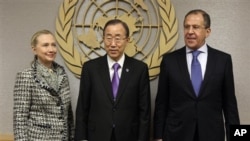Western leaders repeated their call on Monday for Russia and China to support a strong United Nations Security Council resolution to end the violence in Syria, where scores of people have been wounded or killed daily. The appeal came during a high-level meeting on the impact and opportunities of the Arab Spring, which was overshadowed by the Syrian crisis.
United Nations Secretary-General Ban Ki-moon led the call, telling the 15-nation Security Council it is essential that the organization’s most powerful body speak with one voice, particularly in light of the continued "shameful operations" of Syrian President Bashar al-Assad’s army.
The United Nations and the Arab League recently appointed former U.N. chief Kofi Annan as a joint special envoy on Syria. Annan traveled to Damascus recently, holding two days of talks with Assad.
Ban said his predecessor conveyed "concrete proposals" to Assad, urging him to take steps to immediately end the violence, address the humanitarian crisis and begin a peaceful, inclusive, Syrian-led political process.
"I add my voice to that of Mr. Annan in urging President Assad to act swiftly, within the next few days, in response to the proposals put forward by the Joint Special Envoy. I appeal to the Security Council to unite strongly behind ending the violence and supporting Mr. Annan’s mission to help Syria pull back from the brink of a deeper catastrophe," Ban said.
Russia and China have used their Security Council veto twice during the past five months to block action against Damascus, saying that the West and some Arab states are seeking regime change in Syria.
U.S. Secretary of State Hillary Clinton said the Security Council’s silence is not an option in the face of a government’s massacre of its own people, and she urged Moscow and Beijing to support action against Syria.
"We believe that now is the time for all nations, even those who have previously blocked our efforts, to stand behind the humanitarian and political approach spelled out by the Arab League. The international community should say with one voice - without hesitation or caveat - that the killings of innocent Syrians must stop and a political transition must begin," Clinton said.
In a rare rebuke for a close ally, Russian Foreign Minister Sergei Lavrov said Syrian "authorities bear a huge share of responsibility for the current situation." He said Moscow wants to see an immediate end to the violence, a cease-fire and access for relief workers. But Lavrov warned against international action that could escalate the crisis. He is heard here through a translator:
"Making hasty demands for regime change, imposing unilateral sanctions designed to trigger economic difficulties and social tensions in countries, inducing the opposition to continue its confrontation with authorities instead of promoting dialogue, making calls in support of armed confrontation and even to foreign military intervention - all of the above are risky recipes of "geopolitical engineering" that can only result in the spread of conflict," Lavrov said.
Lavrov said that during his meeting with Arab League ministers on Saturday in Cairo, they agreed to five points for settling the crisis: the end of violence from all sources, an impartial monitoring mechanism, no outside interference, unimpeded humanitarian access and strong support for Kofi Annan's mission to launch a political dialogue.
The American and Russian chief diplomats met privately on the sidelines of Monday’s meeting. Secretary Clinton told reporters that she pointed to the Russian foreign minister that the alternative to Security Council unity on Syria is a bloody, internal conflict with dangerous consequences for the entire region.
Britain, which chaired Monday's meeting as Security Council president this month, and France, warned that those who have perpetrated crimes against the Syrian people would not do so with impunity, saying that the groundwork should begin to be prepared for a case at the International Criminal Court.
News
West, UN Call for Strong, Unified Security Council on Syria










